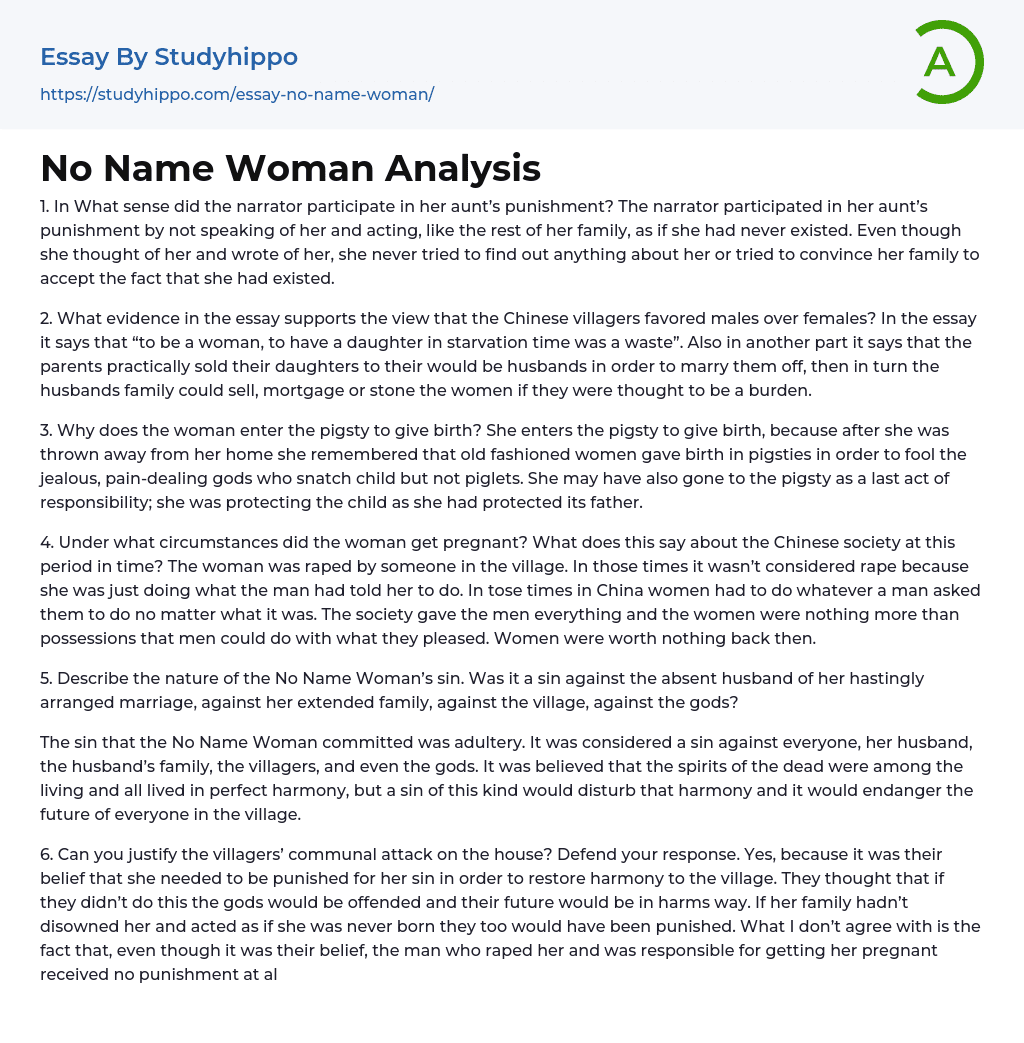1. In What sense did the narrator participate in her aunt’s punishment? The narrator participated in her aunt’s punishment by not speaking of her and acting, like the rest of her family, as if she had never existed. Even though she thought of her and wrote of her, she never tried to find out anything about her or tried to convince her family to accept the fact that she had existed.
2. What evidence in the essay supports the view that the Chinese villagers favored males over females? In the essay it says that “to be a woman, to have a daughter in starvation time was a waste”. Also in another part it says that the parents practically sold their daughters to their would be husbands in order to marry them off, then in turn the husbands family coul
...d sell, mortgage or stone the women if they were thought to be a burden.
3. Why does the woman enter the pigsty to give birth? She enters the pigsty to give birth, because after she was thrown away from her home she remembered that old fashioned women gave birth in pigsties in order to fool the jealous, pain-dealing gods who snatch child but not piglets. She may have also gone to the pigsty as a last act of responsibility; she was protecting the child as she had protected its father.
4. Under what circumstances did the woman get pregnant? What does this say about the Chinese society at this period in time? The woman was raped by someone in the village. In those times it wasn’t considered rape because she was just doing what the man had told her
to do. In tose times in China women had to do whatever a man asked them to do no matter what it was. The society gave the men everything and the women were nothing more than possessions that men could do with what they pleased. Women were worth nothing back then.
5. Describe the nature of the No Name Woman’s sin. Was it a sin against the absent husband of her hastingly arranged marriage, against her extended family, against the village, against the gods?
The sin that the No Name Woman committed was adultery. It was considered a sin against everyone, her husband, the husband’s family, the villagers, and even the gods. It was believed that the spirits of the dead were among the living and all lived in perfect harmony, but a sin of this kind would disturb that harmony and it would endanger the future of everyone in the village.
6. Can you justify the villagers’ communal attack on the house? Defend your response. Yes, because it was their belief that she needed to be punished for her sin in order to restore harmony to the village. They thought that if they didn’t do this the gods would be offended and their future would be in harms way. If her family hadn’t disowned her and acted as if she was never born they too would have been punished. What I don’t agree with is the fact that, even though it was their belief, the man who raped her and was responsible for getting her pregnant received no punishment at all just because he was a man.
- Mass Incarceration essays
- Animal Cruelty essays
- Charles Manson essays
- Crime Prevention essays
- Crime scene essays
- Criminal Justice essays
- Criminology essays
- Cyber Crime essays
- Damages essays
- Detention essays
- Distracted Driving essays
- Drug Trafficking essays
- Drunk Driving essays
- Forensic Science essays
- Gang essays
- Hate Crime essays
- Homicide essays
- Identity Theft essays
- Juvenile Crime essays
- Juvenile Delinquency essays
- Juvenile Justice System essays
- Law Enforcement essays
- Murder essays
- Organized Crime essays
- Penology essays
- Piracy essays
- Prison essays
- Property Crime essays
- Prostitution essays
- Punishment essays
- Punishments essays
- Rape essays
- Robbery essays
- Serial Killer essays
- Sexual Assault essays
- Sexual Assault on College Campuses essays
- Sexual Harassment essays
- Sexual Offence essays
- Stealing essays
- Surveillance essays
- Ted Bundy essays
- Victim essays
- Violent crime essays
- White Collar Crime essays
- Afterlife essays
- Atheism essays
- Bible essays
- Buddhism essays
- Christian Worldview essays
- Christianity essays




